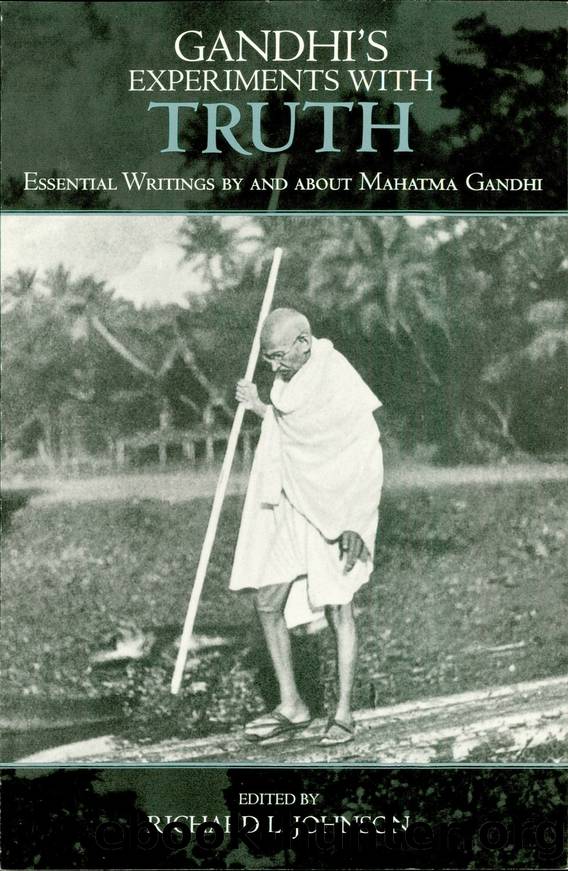Gandhi's Experiments with Truth by Unknown

Author:Unknown
Language: eng
Format: epub
ISBN: 9780739155448
Publisher: Lexington Books
Published: 2013-06-26T00:00:00+00:00
THE POWER OF LOVE
Gandhi claims he can change attitudes and behavior over the long term by mobilizing the power of love. Because he seeks to alter both attitudes and behavior, he asks how people who are committed to particular ideas about what is real, possible, and good can voluntarily come to a different understanding. If individuals are ambivalent or unsatisfied about their current views, then they are open to solid, rational arguments to change. But Gandhi recognizes that those he wants to convert usually carry their own strong convictions and are not readily open to alternative, particularly conflicting, standards. Therefore, he reasons, he must appeal to their âheart,â and he does this through love. Then, he believes, his opponents are open to the possibility of seeing the world in a different way. Once this happens, he thinks they are ready to hear rational appeals and conversion is possible.
Gandhi knows that conventional applications of power have incredible abilities to change behavior because of the rewards and penalties they carry. But such inducements do not necessarily convince people to genuinely want what they are commanded to do. Moreover, when the inducements are lifted, many return to their earlier ways of thinking and acting, making the effects of power only temporary. Gandhi holds that love is different; it is a force for lasting change which breaks down resistances. For him, love creates the basis for trust rather than the suspicion that accompanies conventional uses of power. It does this by speaking to a transcendent, rather than to an instrumental self, and disclosing what people share.
Holding that everyone has the capacity to love and everyone can respond to love, he argues that it is love that holds people together, not their interests. Moving as it does beyond particularities, love is said to appeal to what is best in persons, and when love is operative, bonds of friendship and community can thrive. Although others have called for strong civic attachments to form a national bond, Gandhi wants to do much more. He intends to universalize love, roaming beyond conventional boundaries and reaching for those who have significantly different ways of looking at the world. Moreover, Gandhian love is expressed nonviolently and, in this way, treats everyone as worthy of respect. Finally, Gandhi holds that because love can melt hatred and anger, it is possible to forge agreements and evolve outlooks that enable different men and women to live together amicably.
By asking people to love their opponents, and even suffer for their commitments, Gandhi wants to avoid what Nietzsche calls resentment.16 Resentment is born out of the hatred and fear we have of those we think are responsible for harming us. It rests on the assumption that if the other is conquered, we are released from its torment and now free to make our own choices. Gandhi sees this as a delusion. Recognizing that others are often a source of injustice and need to be resisted, he wants such resistance to avoid two common mistakes embedded in a politics of resentment.
Download
This site does not store any files on its server. We only index and link to content provided by other sites. Please contact the content providers to delete copyright contents if any and email us, we'll remove relevant links or contents immediately.
| Chakras | Gandhi |
| History | Rituals & Practice |
| Sacred Writings | Sutras |
| Theology |
Fingersmith by Sarah Waters(2373)
Kundalini by Gopi Krishna(2075)
Wheels of Life by Anodea Judith(1884)
The Bhagavad Gita by Bibek Debroy(1852)
Indian Mythology by Devdutt Pattanaik(1840)
The Yoga of Jesus: Understanding the Hidden Teachings of the Gospels by Paramahansa Yogananda(1733)
Autobiography of a Yogi (Complete Edition) by Yogananda Paramahansa(1724)
The Man from the Egg by Sudha Murty(1663)
Chakra Mantra Magick by Kadmon Baal(1578)
The Book of Secrets: 112 Meditations to Discover the Mystery Within by Osho(1569)
The Sparsholt Affair by Alan Hollinghurst(1486)
Avatar of Night by Tal Brooke(1436)
Sparks of Divinity by B. K. S. Iyengar(1436)
Karma-Yoga and Bhakti-Yoga by Swami Vivekananda(1424)
Gandhi by Ramachandra Guha(1403)
The Bhagavad Gita (Classics of Indian Spirituality) by Eknath Easwaran(1400)
The Spiritual Teaching of Ramana Maharshi by Ramana Maharshi(1359)
Hinduism: A Very Short Introduction (Very Short Introductions) by Knott Kim(1302)
Skanda Purana (Great Epics of India: Puranas Book 13) by Bibek Debroy & Dipavali Debroy(1293)
